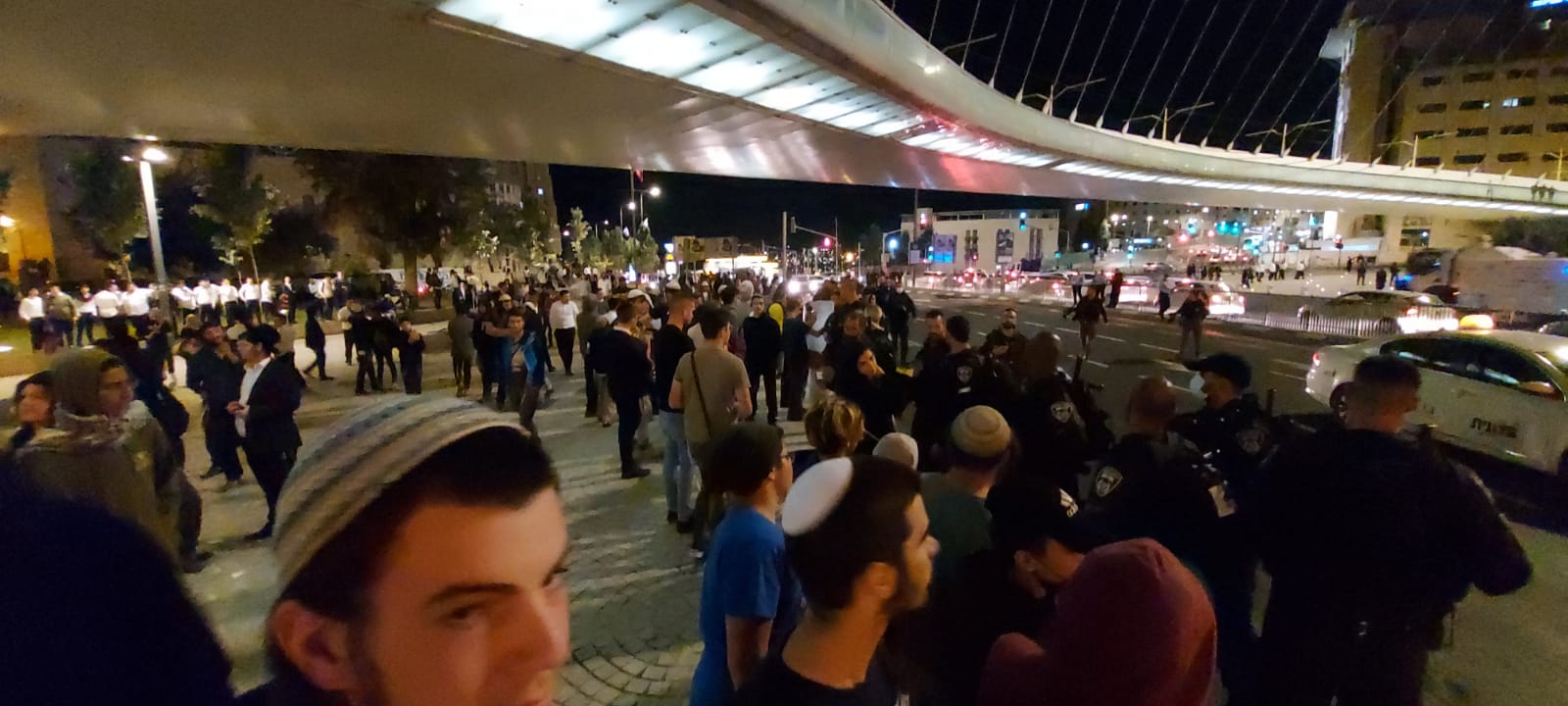Since the death of Ahuvia Sandak, z”l, who was tragically killed in a police car chase on Tevet 6 5781/ December 21, 2020, Honenu has been representing those who are insisting on the investigation of the incident and defending the many who are detained while demonstrating for change in police behavior. The car Ahuvia was in with four other boys overturned when the police car collided with it from behind. Please click here for a list of posts connected to the case.

String Bridge protest for Ahuvia Sandak (November 2021); Photo credit: Free use
Tuesday, January 24, 2023, 16:43 Approximately one month ago, a 14-year-old youth was detained without cause at a demonstration protesting the death of Ahuvia Sandak, z”l. He was invasively searched, handcuffed for a prolonged period of time, and prevented from speaking to his parents before his interrogation. The youth sued the Israel Police in the Jerusalem Magistrates Court for 42,000 NIS. Honenu Attorney Eladi Weisel filed a suit on behalf of the youth.
After filing the suit, Weisel stated, “The detention of the minor and the disgraceful conduct of the police reveals only a small portion of the outrageous conduct of the police with regard to demonstrators protesting Sandak’s death and the questionable means they use to quell the protests. Holding a minor in remand only for the purpose of deterring protests against the police is illegal. The false detention caused the minor prolonged suffering. He was treated as if he were the most dangerous criminal and not a 14-year-old minor who was legally protesting. Unfortunately, this is not the first time that the police have made cynical and illegal use of the detention laws to silence those protesting them. We do not intend to allow this conduct to be ignored.”
In the statement of claim, Attorney Weisel described the baseless detention of the minor, “On December 29, 2022, the minor arrived with friends at the protest that was taking place at the String Bridge [in Jerusalem] to mark two years since the death of Ahuvia Sandak. Several protesters stepped into the street during the protest. Policemen at the scene shoved the protesters back onto the sidewalk near the place where the minor was standing and continued to shove them and all of the protesters who were in their path, among them the minor, toward the other side of the sidewalk.
“As he was being shoved, the minor lost his balance and fell on his back. A split second after he fell, a policewoman tripped in the same place and fell on the minor. Before the stunned minor realized what was happening, the policewoman got up and yelled to her fellow police officers that the minor had tripped her. Several officers immediately jumped on the minor, bent his arm, and led him to a police car as they informed him that he was being detained for assaulting the policewoman.”
Attorney Weisel continued with a description of how the officers abused the minor: “In the doorway of the police car the officers body searched the minor, bound his hands behind his back with a plastic cable tie, and loaded him into a large police vehicle. After he had sat in the large police vehicle for approximately half an hour, he was transferred to a different police car which took him to the Lev HaBira Police Station. At the station, the officers body searched him a second time, and he was put into a cell. After waiting in the cell, he was handcuffed, leg-cuffed, and then taken for interrogation. From this moment on, every time the minor was taken out of the cell, even for a short time, the officers handcuffed and leg-cuffed him. Thus the claimant was forced to spend many hours with his arms and legs shackled. The officers hand and leg-cuffed him every time he went to the bathroom, was taken for interrogation, during interrogation, when he was transferred to the detention center, admitted to the detention center, taken to court, and led through the corridors of the courthouse. He was hand and leg-cuffed even in the courtroom. At every step, the officers restrained him as if he were the most dangerous criminal and not a 14-year-old minor without a criminal record.
“After his interrogation, he was taken to the detention center at the Russian Compound where he was put in a side room for an additional search. To the astonishment of the minor, the prison guard conducting the search demanded that he strip down to his underwear and stand before him. This demand was made without any discretion or consideration of the fact that the detainee was a 14-year-old minor without a criminal record. The serious violation that the 14-year-old youth experienced when he was forced to strip and stand exposed, helpless in front of a prison guard who was considerably older and stronger than he, is obvious. When the prison guard finished examining the minor’s naked body, he ordered him to get dressed. The prison guard took his shoes and his jacket and informed him that he could not enter the detention center with them and that he would be given open-backed shoes instead. As a result, the minor was forced to suffer a cold, winter, Jerusalem night without a jacket or shoes to protect him.
“During the hearing after the detention, the police representative revealed to the court that the reason police had decided not to release the minor was only to discourage further protests in memory of Ahuvia Sandak. This action is unacceptable, illegal, and unethical. This revelation shows the cynical use that the police make of detention laws in an attempt to deter legal protests against them. This situation disturb everyone who is aware of it.”
